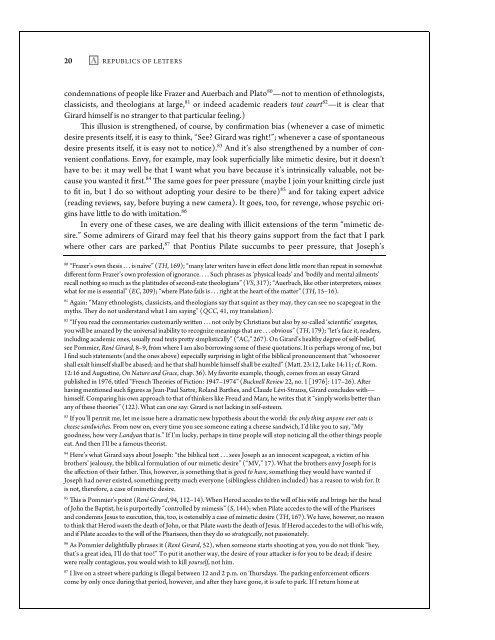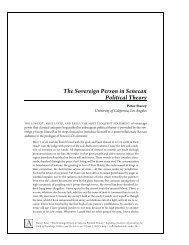Deceit, Desire, and the Literature Professor: Why Girardians Exist
Deceit, Desire, and the Literature Professor: Why Girardians Exist
Deceit, Desire, and the Literature Professor: Why Girardians Exist
Create successful ePaper yourself
Turn your PDF publications into a flip-book with our unique Google optimized e-Paper software.
20 REPUBLICS OF LETTERS<br />
condemnations of people like Frazer <strong>and</strong> Auerbach <strong>and</strong> Plato 80 —not to mention of ethnologists,<br />
classicists, <strong>and</strong> <strong>the</strong>ologians at large, 81 or indeed academic readers tout court 82 —it is clear that<br />
Girard himself is no stranger to that particular feeling.)<br />
This illusion is streng<strong>the</strong>ned, of course, by confirmation bias (whenever a case of mimetic<br />
desire presents itself, it is easy to think, “See? Girard was right!”; whenever a case of spontaneous<br />
desire presents itself, it is easy not to notice). 83 And it’s also streng<strong>the</strong>ned by a number of convenient<br />
conflations. Envy, for example, may look superficially like mimetic desire, but it doesn’t<br />
have to be: it may well be that I want what you have because it’s intrinsically valuable, not because<br />
you wanted it first. 84 The same goes for peer pressure (maybe I join your knitting circle just<br />
to fit in, but I do so without adopting your desire to be <strong>the</strong>re) 85 <strong>and</strong> for taking expert advice<br />
(reading reviews, say, before buying a new camera). It goes, too, for revenge, whose psychic origins<br />
have little to do with imitation. 86<br />
In every one of <strong>the</strong>se cases, we are dealing with illicit extensions of <strong>the</strong> term “mimetic desire.”<br />
Some admirers of Girard may feel that his <strong>the</strong>ory gains support from <strong>the</strong> fact that I park<br />
where o<strong>the</strong>r cars are parked, 87 that Pontius Pilate succumbs to peer pressure, that Joseph’s<br />
80 “Frazer’s own <strong>the</strong>sis . . . is naïve” (TH, 169); “many later writers have in effect done little more than repeat in somewhat<br />
different form Frazer’s own profession of ignorance. . . . Such phrases as ‘physical loads’ <strong>and</strong> ‘bodily <strong>and</strong> mental ailments’<br />
recall nothing so much as <strong>the</strong> platitudes of second-rate <strong>the</strong>ologians” (VS, 317); “Auerbach, like o<strong>the</strong>r interpreters, misses<br />
what for me is essential” (EC, 209); “where Plato fails is . . . right at <strong>the</strong> heart of <strong>the</strong> matter” (TH, 15–16).<br />
81 Again: “Many ethnologists, classicists, <strong>and</strong> <strong>the</strong>ologians say that squint as <strong>the</strong>y may, <strong>the</strong>y can see no scapegoat in <strong>the</strong><br />
myths. They do not underst<strong>and</strong> what I am saying” (QCC, 41, my translation).<br />
82 “If you read <strong>the</strong> commentaries customarily written . . . not only by Christians but also by so-called ‘scientific’ exegetes,<br />
you will be amazed by <strong>the</strong> universal inability to recognize meanings that are . . . obvious” (TH, 179); “let’s face it, readers,<br />
including academic ones, usually read texts pretty simplistically” (“AC,” 267). On Girard’s healthy degree of self-belief,<br />
see Pommier, René Girard, 8–9, from where I am also borrowing some of <strong>the</strong>se quotations. It is perhaps wrong of me, but<br />
I find such statements (<strong>and</strong> <strong>the</strong> ones above) especially surprising in light of <strong>the</strong> biblical pronouncement that “whosoever<br />
shall exalt himself shall be abased; <strong>and</strong> he that shall humble himself shall be exalted” (Matt. 23:12, Luke 14:11; cf. Rom.<br />
12:16 <strong>and</strong> Augustine, On Nature <strong>and</strong> Grace, chap. 36). My favorite example, though, comes from an essay Girard<br />
published in 1976, titled “French Theories of Fiction: 1947–1974” (Bucknell Review 22, no. 1 [1976]: 117–26). After<br />
having mentioned such figures as Jean-Paul Sartre, Rol<strong>and</strong> Bar<strong>the</strong>s, <strong>and</strong> Claude Lévi-Strauss, Girard concludes with—<br />
himself. Comparing his own approach to that of thinkers like Freud <strong>and</strong> Marx, he writes that it “simply works better than<br />
any of <strong>the</strong>se <strong>the</strong>ories” (122). What can one say: Girard is not lacking in self-esteem.<br />
83 If you’ll permit me, let me issue here a dramatic new hypo<strong>the</strong>sis about <strong>the</strong> world: <strong>the</strong> only thing anyone ever eats is<br />
cheese s<strong>and</strong>wiches. From now on, every time you see someone eating a cheese s<strong>and</strong>wich, I’d like you to say, “My<br />
goodness, how very L<strong>and</strong>yan that is.” If I’m lucky, perhaps in time people will stop noticing all <strong>the</strong> o<strong>the</strong>r things people<br />
eat. And <strong>the</strong>n I’ll be a famous <strong>the</strong>orist.<br />
84 Here’s what Girard says about Joseph: “<strong>the</strong> biblical text . . . sees Joseph as an innocent scapegoat, a victim of his<br />
bro<strong>the</strong>rs’ jealousy, <strong>the</strong> biblical formulation of our mimetic desire” (“MV,” 17). What <strong>the</strong> bro<strong>the</strong>rs envy Joseph for is<br />
<strong>the</strong> affection of <strong>the</strong>ir fa<strong>the</strong>r. This, however, is something that is good to have, something <strong>the</strong>y would have wanted if<br />
Joseph had never existed, something pretty much everyone (siblingless children included) has a reason to wish for. It<br />
is not, <strong>the</strong>refore, a case of mimetic desire.<br />
85 This is Pommier’s point (René Girard, 94, 112–14). When Herod accedes to <strong>the</strong> will of his wife <strong>and</strong> brings her <strong>the</strong> head<br />
of John <strong>the</strong> Baptist, he is purportedly “controlled by mimesis” (S, 144); when Pilate accedes to <strong>the</strong> will of <strong>the</strong> Pharisees<br />
<strong>and</strong> condemns Jesus to execution, this, too, is ostensibly a case of mimetic desire (TH, 167). We have, however, no reason<br />
to think that Herod wants <strong>the</strong> death of John, or that Pilate wants <strong>the</strong> death of Jesus. If Herod accedes to <strong>the</strong> will of his wife,<br />
<strong>and</strong> if Pilate accedes to <strong>the</strong> will of <strong>the</strong> Pharisees, <strong>the</strong>n <strong>the</strong>y do so strategically, not passionately.<br />
86 As Pommier delightfully phrases it (René Girard, 52), when someone starts shooting at you, you do not think “hey,<br />
that’s a great idea, I’ll do that too!” To put it ano<strong>the</strong>r way, <strong>the</strong> desire of your attacker is for you to be dead; if desire<br />
were really contagious, you would wish to kill yourself, not him.<br />
87 I live on a street where parking is illegal between 12 <strong>and</strong> 2 p.m. on Thursdays. The parking enforcement officers<br />
come by only once during that period, however, <strong>and</strong> after <strong>the</strong>y have gone, it is safe to park. If I return home at



